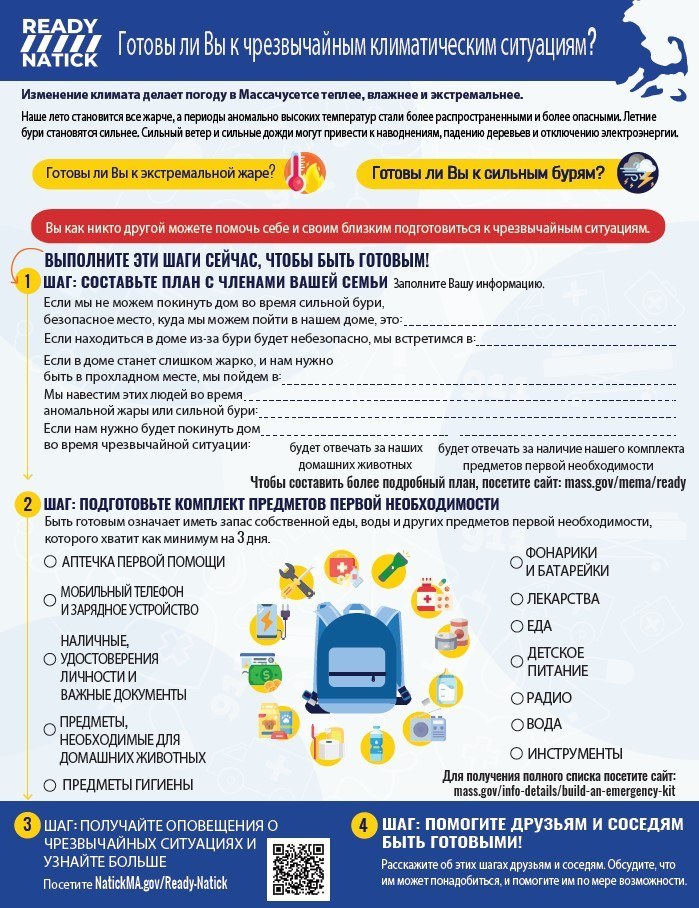If there’s something strange in your neighborhood, you call the Ghostbusters.
But who do you call when there is flooding? A super hot day? A power outage?
It quickly becomes less obvious, especially if English isn’t your first language.
The following project was designed to address suggestions from residents who participated in a 2021-2022 research process, titled the MetroWest Climate Equity Project. Many of these residents’ first language was not English and they wished that their municipality communicated about climate readiness in a proactive and culturally resonant way. They suggested that the municipality send them printed, translated materials – such as postcards and fridge magnets— to increase knowledge. As part of NACCHO’s Climate and Health Demonstration Sites program, the Town of Natick and the City of Framingham worked to do just that.
The municipalities hired six individuals living in frontline neighborhoods, called Community Climate Liaisons, to co-design climate preparedness materials. In collaboration with health, police, fire, and sustainability staff, and with support from the Metropolitan Area Planning Council, Natick and Framingham worked with the Climate Liaisons over a series of three workshops to design and mail translated materials:
- In the first session, Liaisons shared what resources they would need to feel prepared for climate emergencies and how to get the word out to their communities about emergency preparedness.
- In the second session, municipal partners highlighted emergency preparedness resources that were available in Natick and Framingham. The Liaisons reflected on which resources were most important to share and where there might still be gaps. Liaisons also provided feedback on the municipalities’ emergency preparedness websites, which both Natick and Framingham used to revise their webpages. On their own time, Liaisons were asked to share a first draft of the communication materials with their network to help identify what content was most compelling, what was confusing, etc.
- During the third session, the Liaisons engaged in a series of design sprint exercises. These exercises helped refine the format, design, and content of resources.
Results
- The Town of Natick created an emergency preparedness brand, Ready Natick, and an associated webpage, guided by Climate Liaison feedback: https://natickma.gov/ready-natick
- The City of Framingham updated their emergency preparedness webpage, based on Climate Liaison feedback: https://www.framinghamma.gov/1856/Ready-Framingham
- The team sent fridge magnets and flyers about climate preparedness to 6,933 households in Environmental Justice neighborhoods in Natick and Framingham. The materials were translated into four languages (Spanish, Portuguese, Haitian Creole and Russian).
- The Natick Director of Public Health shared results from the project with public health professionals across the country at the NACCHO 360 Annual Conference.

Lessons Learned
The work of the municipalities and Climate Liaisons lay a strong foundation for improving climate preparedness among residents whose first language is not English. Municipal staff learned more about the challenges faced by these populations and now better understand ways to connect with residents. Here are key findings from the experience:
- Simplicity is Key: When reviewing websites and proposed communication materials, the Liaisons made it clear that less is more. They emphasized that communications should always be visual to attract residents’ attention and make it easier for residents who don’t speak English as their first language.
- Translation is Necessary: Framingham and Natick residents speak a diversity of languages. In order to promote equitable awareness of resources, municipalities must translate their websites and materials. As a result of this project, the municipalities updated their websites to more prominently display Google Translate options.
- Multiple Communication Methods are Necessary: Climate Liaisons recommended broadcasting communications through a variety of channels. They said that they—and others in their community— receive information from social media, church, schools, housing authorities, and word of mouth.
Contact Information for Town of Natick
Jillian Wilson Martin
Director of Sustainability , Town of Natick
[email protected]






